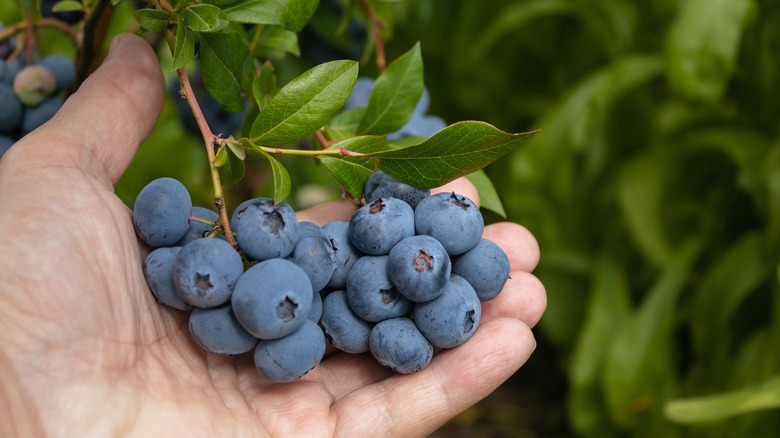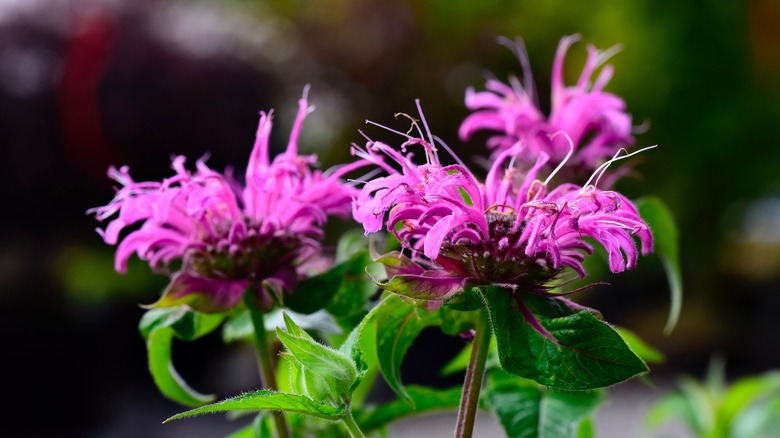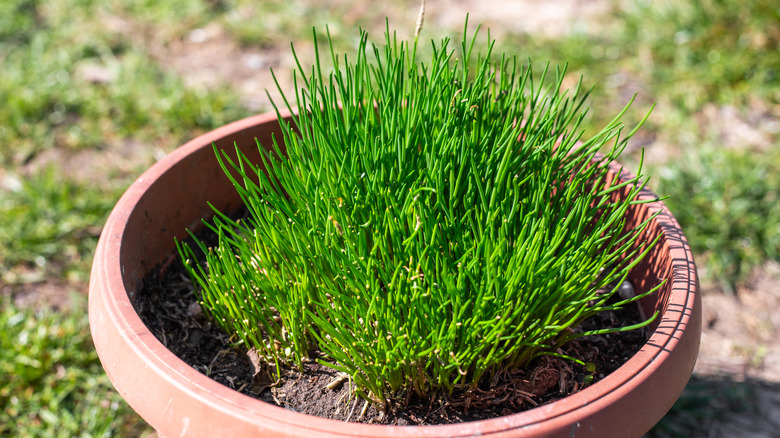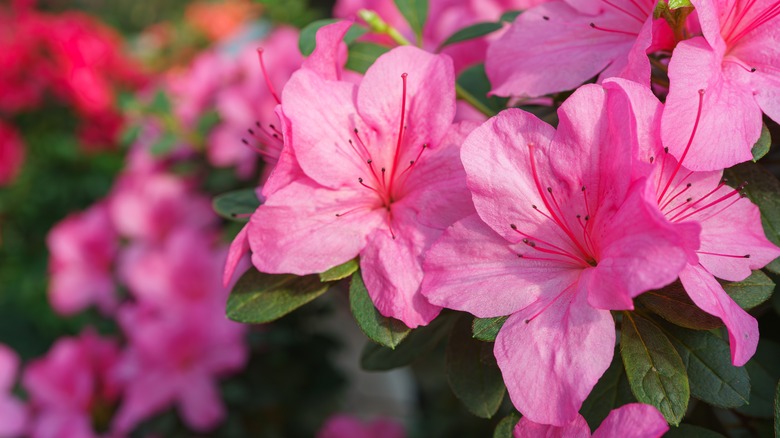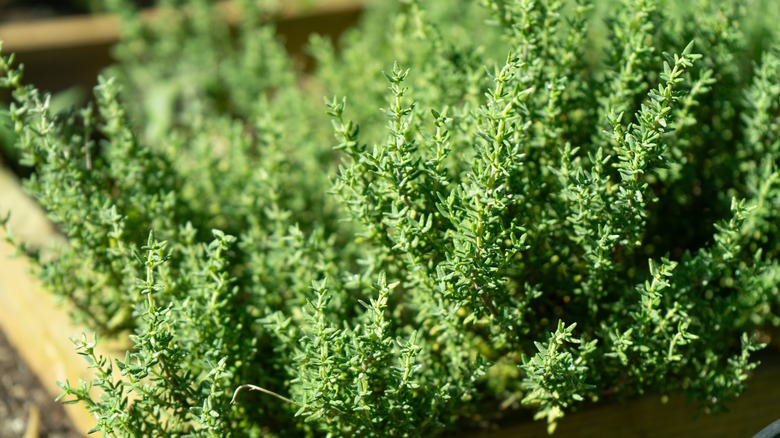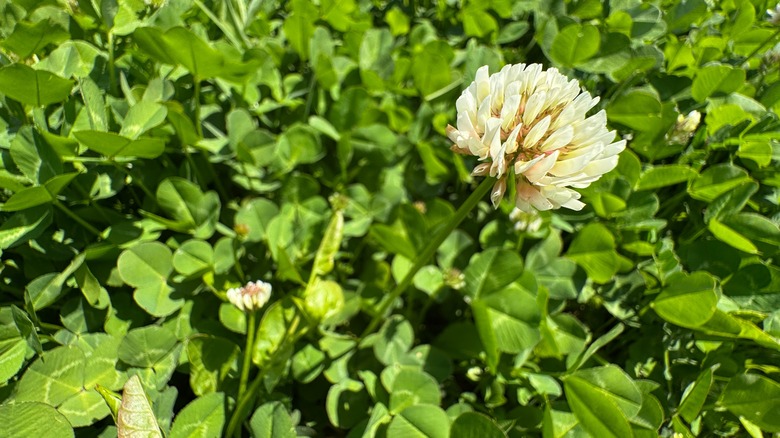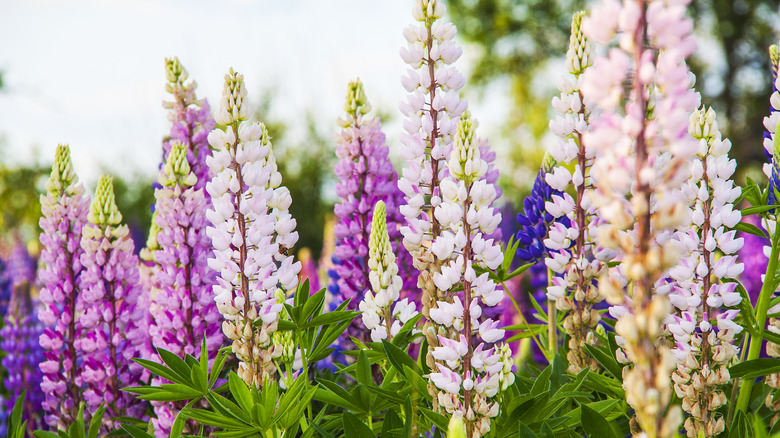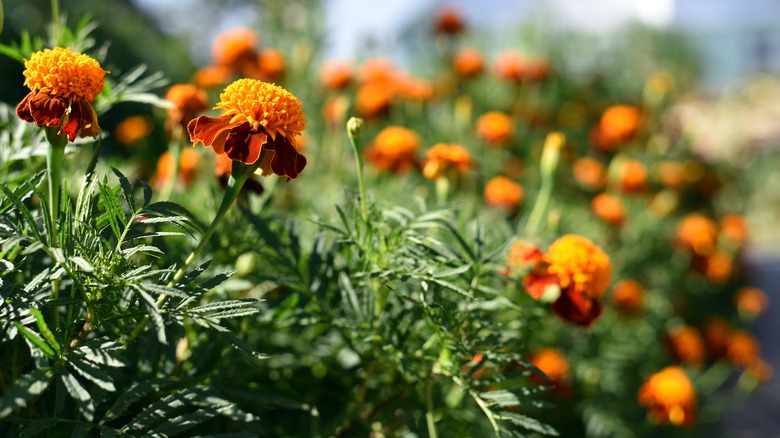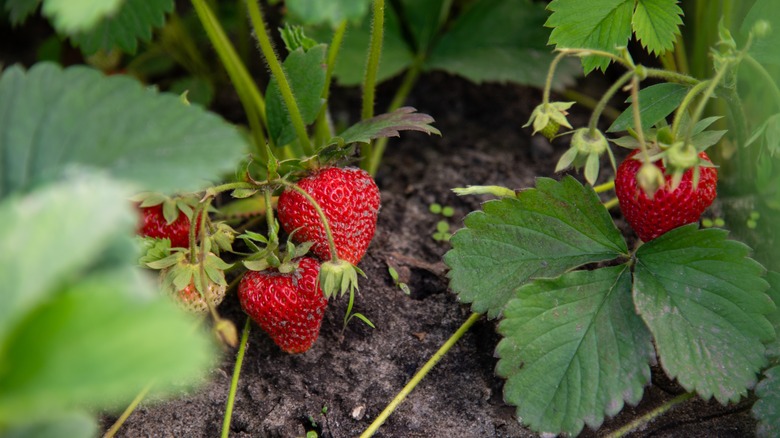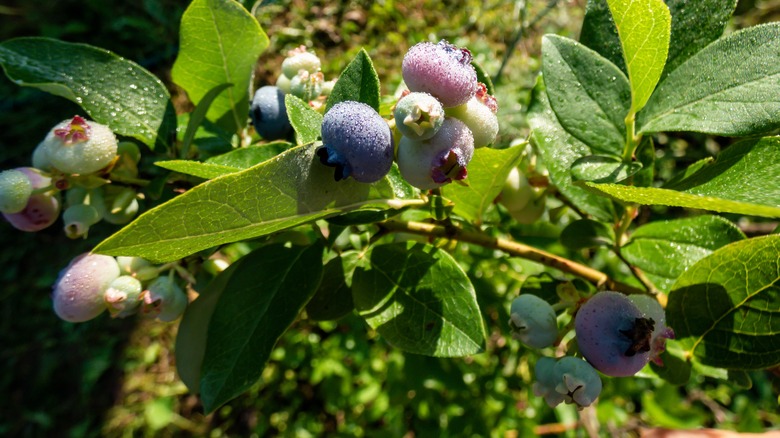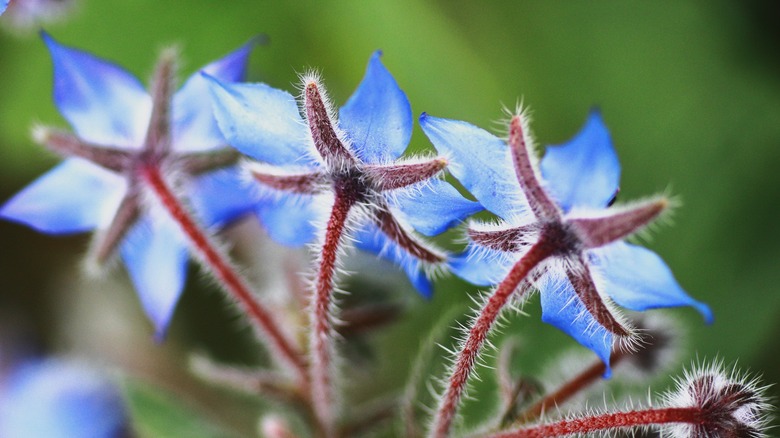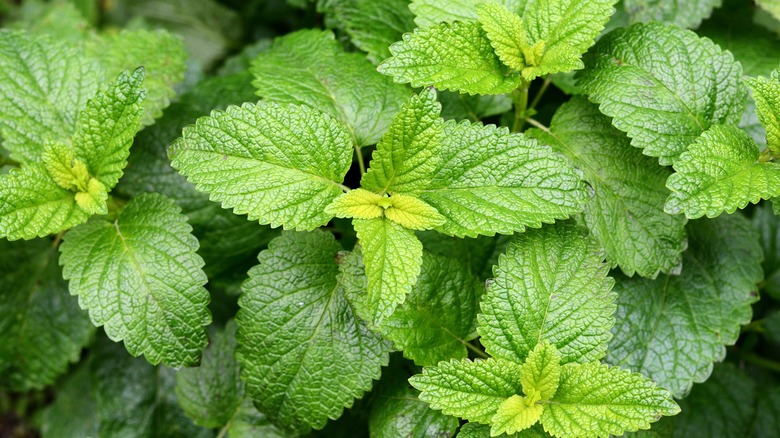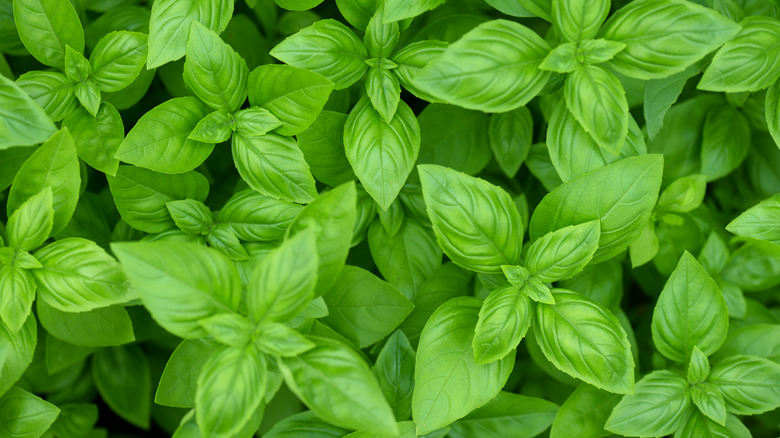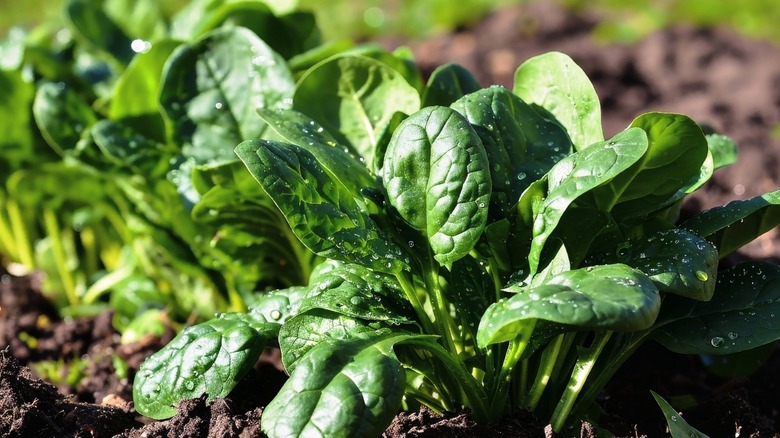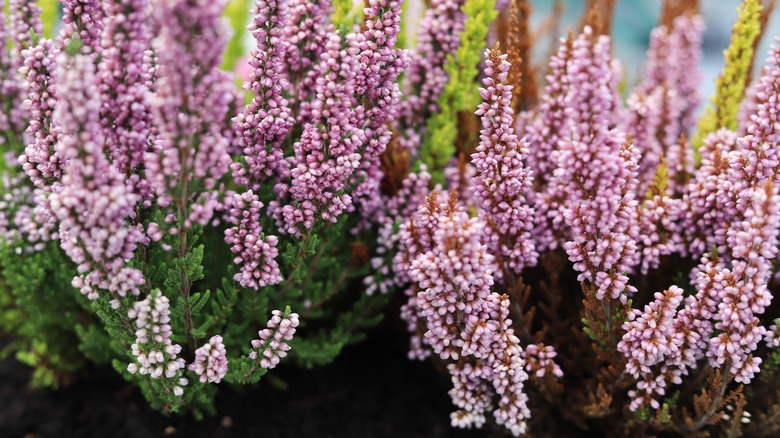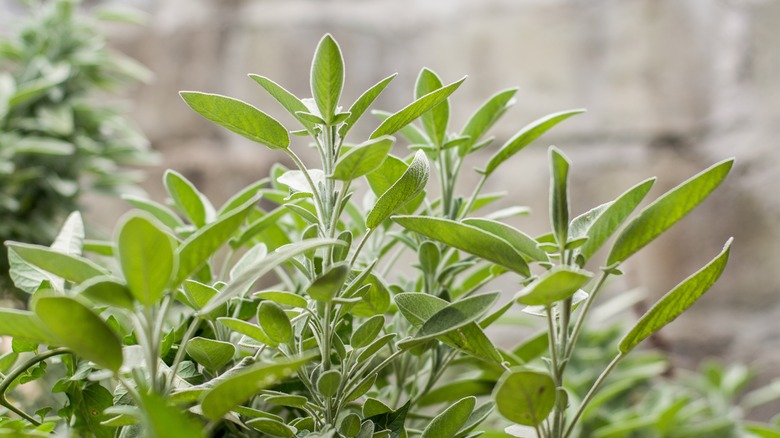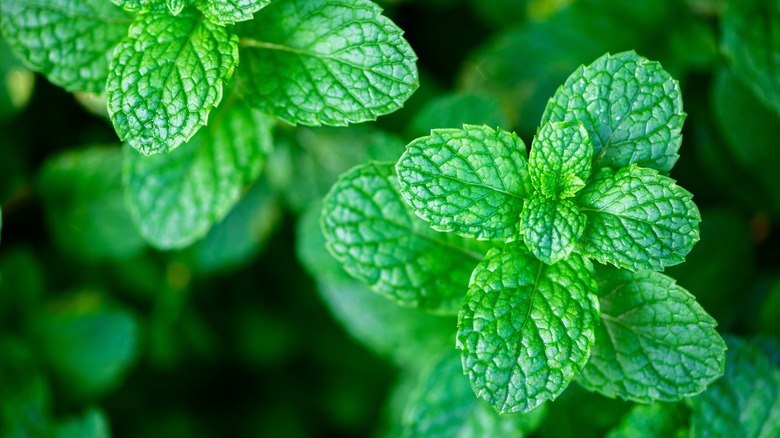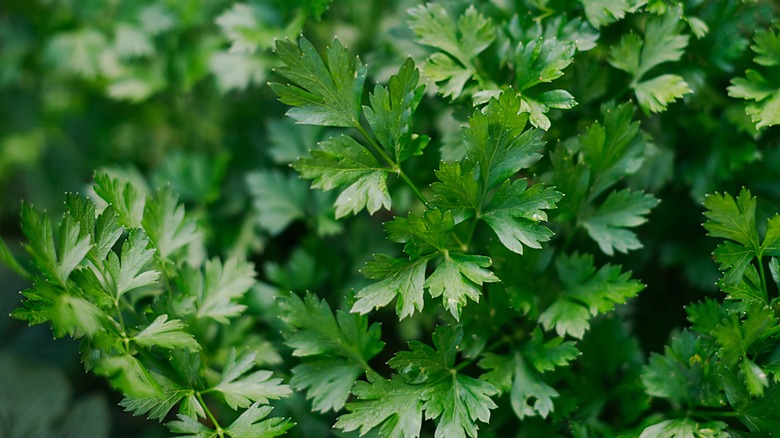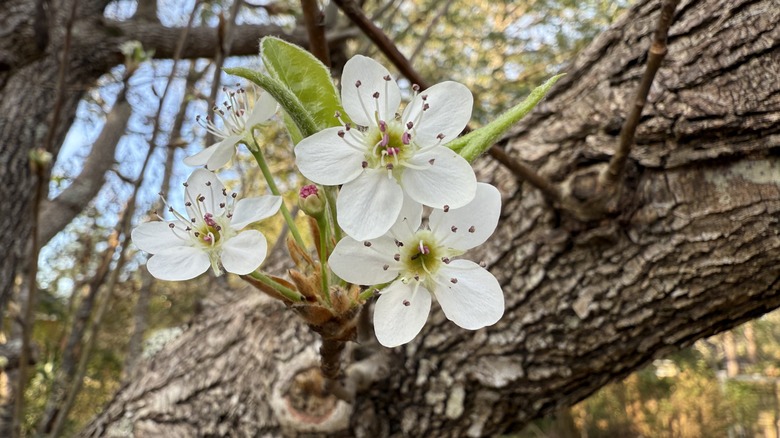The 18 Companion Plants That Will Make Your Blueberry Bush Thrive In The Garden
Few plants appeal to gardeners as much as blueberry bushes. They are easy to grow, the fruit is extremely healthy, and both children and adults love them. When they are in flower, they make an excellent ornamental plant, as well. You can expect about five to six pounds of berries from a blueberry bush — less if it is a half-high kind, of course. But if you want a bountiful harvest, as much as 10 to 20 pounds per plant, you will have to give a helping hand to your blueberry bushes.
And that is where companion plants can help. Bee balm, chives, azaleas, thyme, lupine, and marigolds all make excellent companions for blueberries. These companions help by attracting pollinators, keeping pests at bay, enriching the soil, and retaining soil moisture.
All of this helps keep blueberry bushes healthy in the garden, which not only improves yields but also keeps them thriving for years. When selecting companion plants, avoid choosing something that requires different growing conditions. For instance, you don't want to pick something that likes alkaline soil, as blueberries need acidic soil. Also, avoid plants with deep roots, as blueberry bushes have shallow roots, which could get easily outcompeted or disturbed.
Bee Balm
A blueberry plant can only produce fruit if its flowers get pollinated. And guess who are the primary pollinators of flowering plants? Insects. That is where bee balm (Monarda didyma; USDA Plant Hardiness Zones 4 to 9) can help. Not only will they add contrast to your perennial borders, but they will also help attract a wide range of insects, like butterflies and bees, as well as birds such as hummingbirds, when they bloom. Just make sure to give them slightly acidic and well-drained soil rich in organic matter.
Chives
If you want your blueberry companion plant to pull quadruple duty, choose chives (Allium schoenoprasum). First, being a member of the allium group, it contains sulfur compounds, which give it its distinctive aroma, keeping pests at bay. Second, its purple flowers attract beneficial insects and pollinators to the garden. Third, it is edible, and fourth, it can also be used as an ornamental. You can plant them in zones 4 to 8, in a spot that gets a good amount of sun, although they can survive in partial shade, too.
Azaleas
Azaleas (Rhododendron) are known for their abundant floral displays, so plentiful that sometimes you can hardly see the leaves. But did you know that they also make excellent companion plants for blueberries? Both have overlapping flowering months. And azaleas, with their pink, red, purple, and orange blooms, attract bees and hummingbirds that can help pollinate blueberries. You can plant them if you live in zones 4 to 8. However, place them in dappled shade, as full sun can scorch their leaves. Also, if your garden soil is clay, they won't grow.
Thyme
If you are a fan of aromatic herbs, grow thyme (Thymus vulgaris; zones 5-9) in your blueberry garden. Its small flowers attract pollinators like butterflies, bees, and a bunch of other pollinating insects. They also attract predatory bugs like parasitic wasps and hoverflies, which are also helpful to blueberry plants. These can keep the number of harmful insects around your blueberries in check. Also, if you opt for creeping thyme (Thymus serpyllum; zones 4-9), it serves as an excellent ground cover, keeping weeds at bay, which may otherwise outcompete blueberry bushes with shallow roots.
White Clover
White clover (Trifolium repens) is a legume, and that means it helps improve soil fertility by fixing nitrogen in the soil. This can help blueberry bushes as they thrive in rich soils. Other than that, white clover also attracts pollinators, helps break up soil compaction, and is an excellent ground cover. You can plant it in USDA zones 3 to 9, and since it has shallow roots, it won't disturb your blueberry bushes either. Just make sure to keep its aggressive growth habit in check.
Lupine
Lupine (Lupinus × hybrida) grows in the same zones (4 to 8) as blueberries, and it prefers acidic soil with a pH lower than six, just like blueberries. The plant has somewhat poisonous characteristics and can be planted in borders around the blueberry bushes. This will help keep away rabbits and deer from your garden, as they tend to avoid lupine. Other than that, lupine also fixes nitrogen in the soil as well as attracts pollinators and predatory bugs, both of which will increase your berry harvest.
Marigolds
Marigolds (Tagetes) can be grown pretty much everywhere in the US, anywhere from zones 2 to 11. They keep the pests at bay while, at the same time, attracting pollinators, providing valuable support for blueberry plants. What makes them unique as companion plants, though, is that their roots release a chemical called alpha-terthienyl. This suppresses parasitic nematodes that attack plants, including blueberry bushes, such as root-knot nematodes. Also, they have a strong, predator-repelling scent, so you can plant them in a border around blueberries to keep away rabbits and deer.
Strawberries
Out of the small fruit plants, strawberries (Fragaria x ananassa) are the most popular. And if you like smoothies, you probably know a blueberry and strawberry duo is hard to beat. But did you know they work great together as companions in the garden, too? Strawberries can be grown as a groundcover acting as a living mulch, which can help retain moisture and suppress the growth of weeds around blueberry bushes. Also, strawberries attract pollinators and have shallow roots, so they won't compete with your blueberries. You can grow them in zones 5-9, in clay or loam soils rich in organic matter.
Other Blueberry Varieties
Even though blueberry pollen is sticky and heavy, highbush blueberry cultivars can self-pollinate to some extent. However, without pollinators, harvests often fail to reach their full potential. That is where planting other blueberry varieties can help. Planting with other varieties leads to cross-pollination, which can improve berry yield. In addition, selecting multiple cultivars is a good idea because different cultivars ripen at different times, and you will get to enjoy a longer harvest season.
Borage
Borage (Borago officinalis) is an excellent flowering ground cover that will help your fruit trees thrive in the garden. It produces beautiful blue flowers in fall and spring that entice a number of pollinators, including bees. But its real benefit for blueberry bushes comes from its ability to add trace minerals to the soil where it is grown, which can help improve plant health. Also, it helps any plant it is grown with by enhancing its resistance to pests and diseases. The best part? It can be grown everywhere in the US, from zones 2 to 11.
Lemon Balm
Lemon balm (Melissa officinalis) is a lemon-scented herb that actually won the Herb of the Year title in 2007. And it is exactly this strong lemony scent that helps it to keep unwanted insects away. But don't worry. It still attracts bees, butterflies, and even hummingbirds, so your blueberries will still get pollinated. You can plant it anywhere in zones 3 to 7 in well-drained soils. Just keep in mind that it is an aggressive spreader, so consider planting it in containers so it won't take over your garden.
Basil
Basil (Ocimum basilicum) is one of the most popular and easiest to grow culinary herbs, and you can use it as a companion with your blueberry plants as well. It has shallow roots, so it won't fight your blueberries for resources. Instead, it helps them out by keeping pests away and attracting pollinators, such as bees and butterflies. Its pest repellent properties come from its aroma, which can keep mosquitoes at bay. The only issue with choosing basil as a companion plant is that it grows well only in zones 10 and 11, and even then, only in full sun and well-drained soils.
Spinach
Spinach (Spinacia oleracea) is an annual vegetable that you can grow pretty much everywhere in the US (from zones 2 to 11). The benefit of growing it with blueberries is that it has shallow roots, and it won't disturb your blueberry bushes. Plus, when you plant it under your blueberries, it will act as a groundcover, helping retain moisture in the soil and also allowing you to maximize the use of space.
Scotch Heather
If you are looking for a companion plant for blueberries that can grow in poor soil, go with Scotch heather (Calluna vulgaris). Nevertheless, its companion plant benefits stem from its ability to act as good groundcover, acting as a living mulch. This can help preserve soil moisture and keep out weeds, both good things for blueberries. You can grow it in zones 4 to 6, and when it blooms in fall and summer, it will also attract pollinators to the garden.
Sage
Sage (Salvia officinalis) is another excellent companion plant for blueberry shrubs, which you will appreciate if you love cooking with and growing herbs. Its flowers attract bees, butterflies, and sometimes even hummingbirds. Aside from that, sage also keeps insect pests away, thanks to cineole and camphor, which give it its earthy scent. These are bioactive compounds present in sage that can make bugs lose their senses. You can plant sage with your blueberries in zones 4 to 8. Just make sure the soil is not too wet or poorly drained.
Mint
Mint (Mentha spicata) is an aromatic, flowering herb that also makes a good groundcover. It grows well from zones 4 to 9 in the US in organically rich soils that receive full sun. Its companion plant benefits come from its ability to attract predatory bugs like hoverflies and minute pirate bug, which can keep the number of whiteflies, thrips, and aphids in check — all common pests of blueberry bushes. Mint aroma helps too, which many pests dislike. Furthermore, mint also produces nectar-rich small flowers which can lure pollinators, including bees and butterflies.
Parsley
Parsley (Petroselinum crispum) is a common plant, yet it has many properties that not many people know about. Its use as a companion plant for blueberries is one of them. It's great to plant alongside blueberries, as it keeps destructive insects away. This is because of the insecticidal compounds present in its essential oils. Furthermore, parsley also attracts beneficial bugs, which prey on plant pests, as well as predators. It is mainly grown as an annual, but if you live in zones 5 to 11, you can grow it as a biennial.
Flowering Dogwood
Flowering dogwood (Cornus florida) is one of the most common ornamental trees, and it makes a good companion for blueberry bushes. It prefers acidic soil and has similar sunlight requirements, as well. But what makes it useful for blueberry plants is its beautiful spring flowers. These attract a number of pollinators, including bees and butterflies. You can plant it in zones 5 to 9. To get the most out of it, make sure you know the best spot to plant a flowering dogwood tree for stunning spring blooms.
